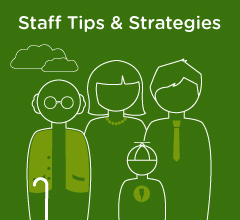Coping with Recuperation

Author:
Reverend Deborah Vaughn, M.Div., JSSA Hospice Chaplain
Recently, I read a post on a favorite blog by someone who had to have foot surgery. The day before her procedure she posted on Facebook that she’d never been on crutches before and asked for tips on how to manage it. Each health challenge is different, but I think there are some common ways to help us cope. I’ve been a friend and companion to many who have had a major illness, surgery or accident. I thought about what I learned from others who are in this experience. Perhaps these ideas for coping while you recuperate will be helpful.
1. Nothing Lasts Forever.
Nothing. Really. For some people even a “terminal disease” ends in something greater than the present human existence. So having hope for the future, however your spirituality or faith defines it, can be your default setting. What are you learning from this about yourself, your family, and your faith? It can be a source of strengthening and comfort. Even so…
2. It’s Ok to be Discouraged.
We are real human beings, with real human emotions. When we are faced with a long recuperation, or we don’t QUITE get back to the functioning level where we started, it’s a little frustrating. Wait. A lot frustrating. We must give each other permission to be discouraged. That lingering problem won’t go away overnight. Admitting or voicing our discouragement is a way to put it out there to see, analyze and decide how to move on it. That’s why I think it’s important to…
3. Find People Who Will Listen to You, Reflect with You, and Help You Take the Next Steps Forward.
This is a tough job. You have to be sympathetic, but not buy into the “poor me, poor, poor me” line. When I’m the listener, I try to listen intently for what the person thinks is their way through the current mess. A realistic one, mind you. Overspending your budget and praying to win the lottery? I can’t join you in that one…but I can respond by agreeing with you that you have something to overcome, and then be sincere in my support as you take action. This is also the place where you…
4. Learn That You Have to Accept Help Sometimes!
I had severe postpartum anemia after both of our daughters were born. I was so bright white I was glaring. There was no color in my cheekbones. (I didn’t realize how pale I was until I saw pictures, years later, of my anemic self.) Fortunately, I had a husband and parents who helped enforce the “rest when the baby sleeps” rule. Meals, laundry, cleaning, errands, logistics… someone else was in charge. I gave up the car keys and the grocery shopping. I was fortunate that I had this help, and people wise enough to insist when I was determined to “do it all.” It can be difficult to let people help you when you’re used to being a capable and responsible person, but accepting help can make your healing and adjustment to the recuperation process go much more smoothly.
5. When the New Reality is Painful, Give Yourself Permission to Grieve the Old Reality.
It doesn’t matter what it is…you discover you have a medical condition that requires daily pills and regimens. Grieve it. You finally understand that having children means you have agreed to set aside your plans when you have a sick child. Accept it. You realize you can’t eat certain foods ever again if you want to be healthy. Mourn it. You have a diagnosis that (frankly) is hard to accept and scares you. Honor it as best you can, cry when you need to, and live as long as you can. (That last sentence, by the way, can take the rest of your life. That’s not a weekend project!)
Final Thought:
The Egyptian philosopher Philo said, “Be kind, for everyone you meet is fighting a hard battle.”
It may not be visible. It may not be understandable. But in the heart of the suffering person, it is very real. You never hurt anyone by being kind. (I’m still working on that one…)
